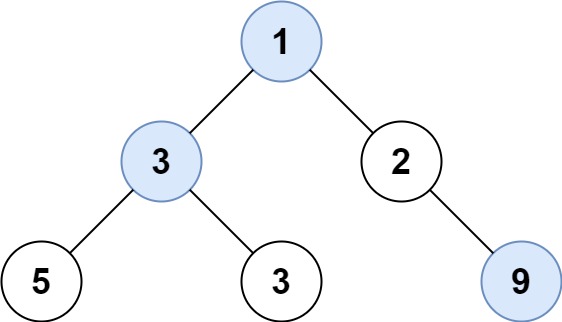Given the root of a binary tree, return an array of the largest value in each row of the tree (0-indexed).
Example 1:
Input: root = [1,3,2,5,3,null,9] Output: [1,3,9]
Example 2:
Input: root = [1,2,3] Output: [1,3]
Constraints:
- The number of nodes in the tree will be in the range
[0, 104]. -231 <= Node.val <= 231 - 1
Related Topics:
Tree, Depth-First Search, Breadth-First Search, Binary Tree
// OJ: https://leetcode.com/problems/find-largest-value-in-each-tree-row/
// Author: github.com/lzl124631x
// Time: O(N)
// Space: O(N)
class Solution {
public:
vector<int> largestValues(TreeNode* root) {
if (!root) return {};
vector<int> ans;
queue<TreeNode*> q{{root}};
while (q.size()) {
int cnt = q.size(), maxVal = INT_MIN;
while (cnt--) {
auto n = q.front();
q.pop();
maxVal = max(maxVal, n->val);
if (n->left) q.push(n->left);
if (n->right) q.push(n->right);
}
ans.push_back(maxVal);
}
return ans;
}
};// OJ: https://leetcode.com/problems/find-largest-value-in-each-tree-row/
// Author: github.com/lzl124631x
// Time: O(N)
// Space: O(logN)
class Solution {
public:
vector<int> largestValues(TreeNode* root) {
vector<int> ans;
function<void(TreeNode*, int)> dfs = [&](TreeNode *node, int d) {
if (!node) return;
if (d == ans.size()) ans.push_back(INT_MIN);
ans[d] = max(ans[d], node->val);
dfs(node->left, d + 1);
dfs(node->right, d + 1);
};
dfs(root, 0);
return ans;
}
};